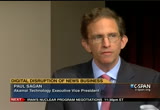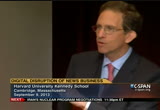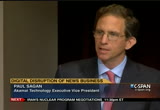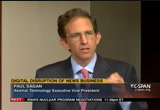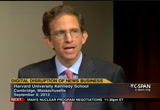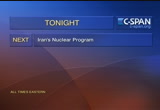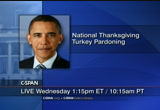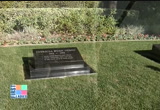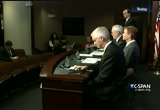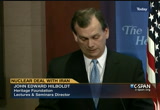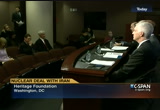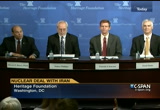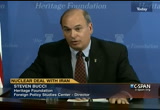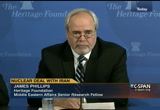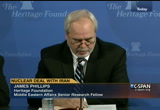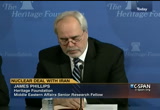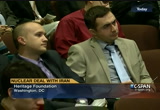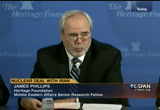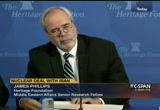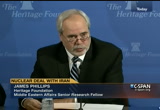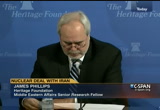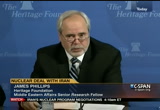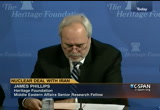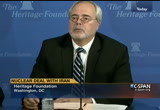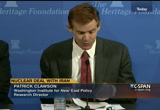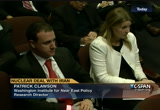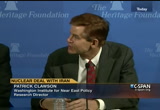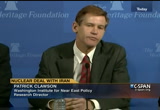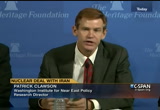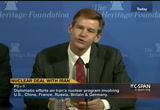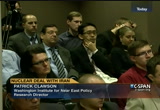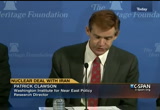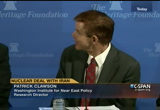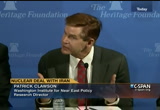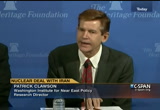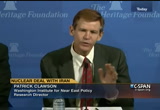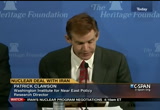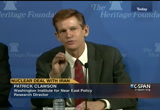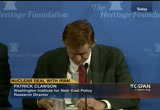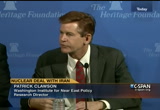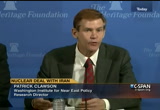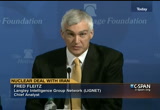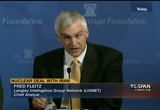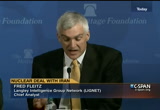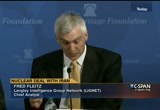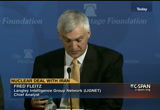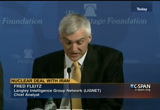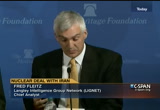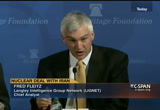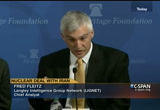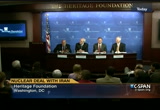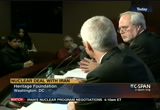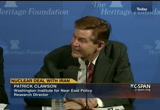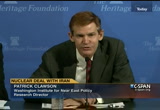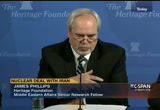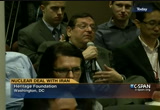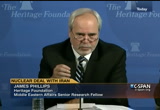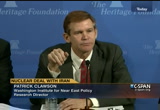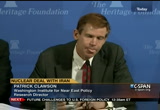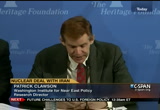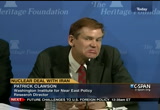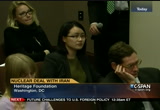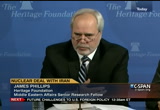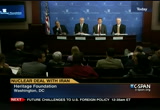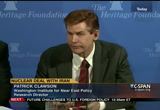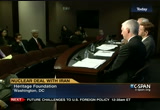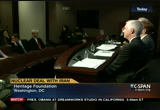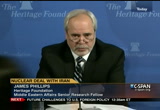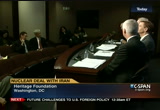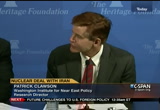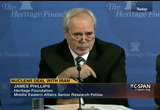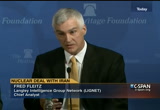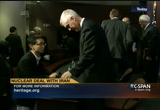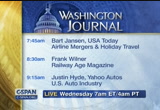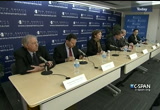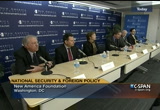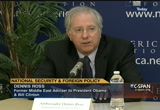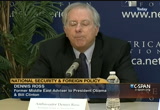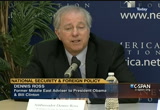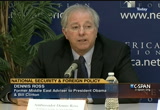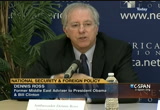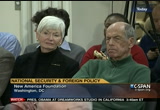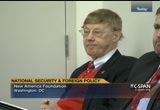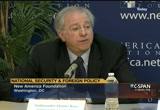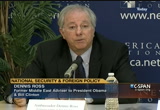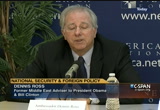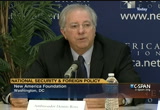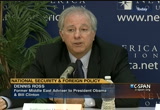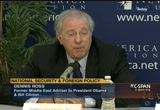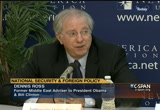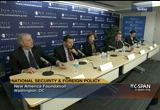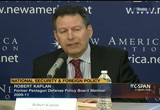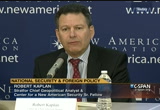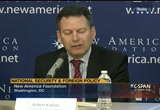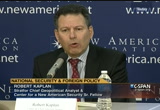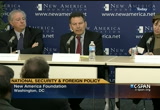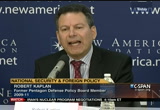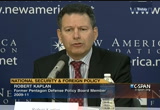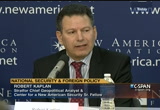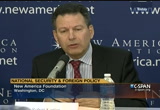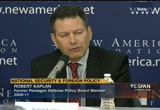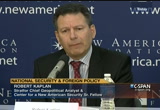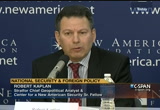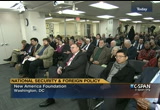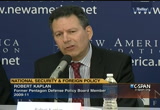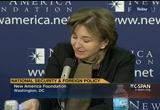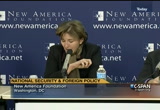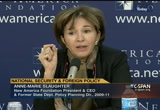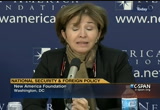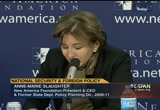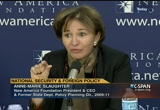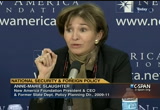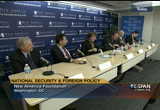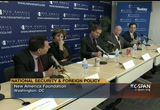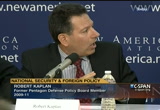tv Key Capitol Hill Hearings CSPAN November 26, 2013 11:25pm-1:31am EST
11:25 pm
journalism that was even more illuminating online to get more voices there. a couple things about the past that were not touched on tonight original the idea of sin. mostly they had a martin and arthur not going away the news for free, this would have worked out ok over the long term. that was not the case. had notone had news given it away for free online, the digital disrupt her's, if a different model gave it away, if you need to string someone up, he gave it away for free with a different business model and that is where the genie got out of the bottle. people had to react. the other thing that is so important. you would not have heard this in a panel years ago and this is about the importance of engineers. journalists and engineers in referring to
11:26 pm
need to know, one thing that news organizations did not do and they seem to be learning now is that you have to embrace engineers, figure out how to harder -- how to higher and collaborate with them. the biggest online today are engineering companies. they are in charge. most of the traditional media companies to did not have them, could not hire them, did not put them in charge. that has to be a theme for successful news online. next anding to happen how is serious journalism going to get paid for since the subsidy of advertising has been .ipped away have a full consensus
11:27 pm
either among the three of us which is really why we built a web-basedas platform. we hope others here at harvard pick up on it and that more voices and interviews get shared ng whatan keep documenti happens. even after we finished the draft of the essay, the globe was sold. the gray arms sold to jeff bezos -- the grahms sold. there is an aspect that is a rashomon tale. no two people agree on what happened. it was confirmed as we went. if you have enough people involved, you could get close enough to understand to what we think happened and to learn what might happen next. we tried to do that in the project and we think it's
11:28 pm
important. understanding how journalism , this is embodied at the kennedy school and the importance of a vibrant press, one thing that was not answered tonight, are we going to find ways to cover the obscure school as effectively as the digital world has already figured out how to cover celebrity gossip, the daily political rants in washington and even the weather? on behalf of martin, john, and myself, the stories ahead will be far more interesting than the stories we have told. we hope that you'll stay tuned to what we have done and more importantly to this evolving thread. we have a warning. watch out for the riptide.
11:29 pm
to sea t washed out it rolls and because it always does. thank you very much and have a great evening. [captions copyright national cable satellite corp. 2013] [captioning performed by national captioning institute] span, ang up on c- examination of the deal reached with iran. a look at foreign-policy facing the u.s. followed by a discussion on digital technology on journalism.
11:30 pm
>> coming up on the next "washington journal comecon aviation -- washington journal, the impact of holiday tribal. amtrak ridership going into the holiday and the expansion of passenger rail. ageguest is from railway magazine. later, yahoo motors giving enough date and the state of the repayment from the 2000 8-2000 nine auto bailout. live every morning at 7:00 a.m. eastern on c-span. >> president obama will pardon the turkey tomorrow morning at the white house live at c-span on 1:00 p.m. eastern. >> this is the rose garden and a very special place in particular
11:31 pm
because mrs. nexen was instrumental for designing. she had an affinity for roses. she was instrumental in opening up the white house for garden tours in the spring, a tradition that continues to this day. this was developed in 1972 by a .rench designer it is the only rows that will continually grow what the white rose.-- it is the only there were only steps away from the 1910 farmhouse. story on theeat epitaph that she chose herself. she wanted to meet the people effected.ffect did -- one of the reporter said to you, what good will any of this do if
11:32 pm
the people you're speaking to cannot understand what you are saying? peopled, even when cannot understand your language, they can see what is in your heart. see it saturday at 7:00 p.m. eastern and the series continues at firstay as we look lady betty ford. >> the heritage foundation hosted a panel discussion critical of the deal reached over the nuclear weapons program. this is just over one hour. >> good afternoon. welcome to the heritage foundation. we welcome those who join us on heritage.org, those of you joining us on c-span today and in the future. we remind all of our internet viewers that comments or questions can be sent to us at
11:33 pm
any time by e-mailing speaker@ heritage.org. we will post it on the website for everyone's future reference as well. ,osting the discussion today director of the douglas and sarah allison center for foreign-policy studies and previously served as senior research fellow for defense and homeland security. he is well-versed in cybersecurity as well as defense for civil authority serving for three decades in army special forces and he continued at the pentagon as deputy secretary of american security affairs. prior to joining us here, he was a lead consultant at ibm on cyber security policy and he is an adjunct professor at george mason university and an associate professor of terrorism studies and cybersecurity at
11:34 pm
long island. please welcome me in joining dr. steve bucci. [applause] welcome todd my everyone here and coming on to c-span. i have to tell you we seldom get right on anf this event. this was planned thinking we would be commenting on the ongoing discussions. now have to comment on what apparently is a deal. treat here with the panel that we have. i will introduce them quickly so that we can get to their remarks . we will start with my colleague jim phillips.ge, he is our middle eastern analyst focused on the middle east and international terrorism since 1978. he's a former research fellow at the congressional research service. the nsa,consultant for
11:35 pm
dod, the national republican institute and a member of the board of editors's middle eastern quarterly. fromwed by patrick clawson the washington institute of near east policy, the largest u.s. think tank focusing on the middle east. he has edited or written over 30 farsi.nd he speaks he can read stuff the rest of us cannot. he has also served as a senior economist at the dod national fornse university, worked the world bank international monetary fund for 18 years was the senior editor of the middle east quarterly and is on the distinguished panel on the department of energy national laboratory which is somewhat relevant because of the specifics of our government. and in the cleanup, fred
11:36 pm
fleitz. the cia,rved with department of state, and the house intelligence committee staff. he is a specialist in wmd proliferation specifically focusing on iranian and north korean program serving for the chief of staff for john bolton and robert joseph who were serving as the undersecretary of state for arms control and he is the founder and chief analyst of leaknet.com. it is a global intelligence and service.ng i have asked each speaker to give us 10-12 minutes of opening comment. right now, we will start with jim phillips.
11:37 pm
>> thanks, steve. the interim nuclear agreement with iran announced last weekend has been called historic, but it remains to be seen whether it is historically bad that fails to halt the drive for nuclear starts or if it's a bad that will need much firmer aessure on iran to salvage sustainable agreement. i think the final answer will not be known for at least six months but i'm afraid it's almost certain that the results will be closer to the former than the latter. it should be noted this is not the first time that iran has not reached a so called historic agreement to monitor the nuclear program. britain, france, and germany thought they had a historic agreement in 2003 when iran agreed to suspend enrichment temporarily and enter
11:38 pm
negotiations. unfortunately, those negotiations went nowhere and they eventually drop the façade of negotiations two years later when it was in their interest to do so. it is called a first step agreement and is clearly more a step towards a nuclear iran than of progress.tep unlike the earlier agreement, the does not enrich programs but it allows them to proceed at a slower pace. the deal temporarily bars for nuclearchment power reactors and that requires iran to reduce its stock pile of
11:39 pm
20% enriched uranium by converting it into forms that will be difficult but not impossible. it requires more intrusive respect chen and that is a good thing and it obligates iran to hold back on fueling the aavywater reactor which is particular point, a particular headache. it will eventually give an alternative plutonium route to a nuclear weapon once it becomes operational. these are all steps in the right direction that can help limit the speed of iran's progress on the nuclear front but the problems do not go far enough and they are easily reversible. the interim agreement includes tactical concessions that amount to little more than a diplomatic speedbump. it is slow but it does not halt
11:40 pm
iranian nuclear program. all the most difficult questions are postponed to the final stage of negotiations and the obama administration has already made major concessions for getting in except the bull but permanent arrangement, in my view. this is a flawed agreement that risks reducing pressure on iran in the next six months in return reneged upon issues. billion to $7 billion over the next six months. the danger is that easing sanctions as part of an interim deal and it will diminish the pressure of undermining the leverage and reduce the ability to get a better deal at the end. they are not required to comply
11:41 pm
with the u.n. council resolutions that called for a halt in uranium enrichment and them to continue bad behavior. that russia has been contracted to fuel the facility at least for the next 10 years. interimproblem is the deal which creates a six-month window for further figures she nation may hinder the ability to reach a good final deal. there may never be a final deal. up -- iran mayg string this up and engage in tactics to force the eager obama administration to enter into accords with corresponding sanctions relief. we have seen how temporary these congeal into permanent solutions
11:42 pm
in the middle east. the obama administration has criticism from congress and u.s. allies, france.arly israel and they have used a sanctions in return for marginal concessions that will not reduce the long- term threat of an iranian nuclear break up. think more, not fewer, sanctions are required. it requires the administration morefrain from imposing the case of the negotiations. administration claims that this will be reversible if iran default on their obligations but as long as they keep the talk of live even if they are just limping along, it will be difficult to reimpose without
11:43 pm
being accused of getting involved. even before the interim deal was reached, they had partisan efforts to impose sanctions on the nuclear program. the spokesperson jay carney went so far as to warrant additional sanction pressure on iran could lead toegotiations and a march to war. i would argue on the contrary, not being tough enough even with sanctions or further talks with could actually increase the chances that israel will go it alone in the nuclear infrastructure. israeli prime minister netanyahu denounced a deal and warned they have the right to defend itself. i think it should not be dismissed or treated lightly.
11:44 pm
be particularly important what happens with regards to the heavywater reactor in iraq which is essentially a plutonium bomb factory. halt theys and not work. lead to a repeat of the korean fiasco only in reverse. in 1994, the clinton administration believed they had closed off north korea's path to a bomb and subsequently north korea had hidden uranium enrichment programs which they use to get a nuclear weapons. the could very well try reverse. another important point is that the iraq heavywater plant will be vulnerable because striking then could result in the release
11:45 pm
of substantial amounts of of theon called on par chernobyl reactor meltdown. that would make a preventative strike virtually impossible. they have twice launched strikes against similar reactors in the past before they could be put into operation. 1981, and most recently in the syria in 2007. it's particularly important to halt work on iraq. commissioning that essentially would give iran a free pass and would close the window on the military option. it allows them to pocket the implicit recognition of its so- called right to enrichment. it's important to note there is no such right.
11:46 pm
the nuclear nonproliferation treaty gives them the right to a peaceful program but does not say anything specifically about enrichment. most or many do not have enrichment but by the fuel from elsewhere. if iran was truly interested in an economic solution, this is the route it would take. it's clear that iran has more than just peaceful intentions. the iranian president has trumpeted this a major deal in which the p5 plus one, the five permanent members of the un security council and germany, has recognized their right to iranian your richmond. it could set the stage for them to withdraw from ago she haitians in the future if it seems they are paying .nsufficient attention the bottom line, this is a thetep because it leaves
11:47 pm
nuclear infrastructure intact and rewards the behavior over the last decade. that doing exchanges not substantially retarget the ability to stage a nuclear breakout. think, moreover, the administration has bent over backwards but has failed to pay significant attention to the equities and concerns of its friends. we have seen israel and saudi arabia raising alarms about the deal. slights its that friends while courting its enemies will soon find that it has less friends and more enemies. i will just stop right there. >> thank you, jim. patrick. >> the editor of the most paper in iran is a
11:48 pm
noted hardliner and close commandants of the supreme leader, the ayatollah. these firebreathing editorials and i do not always agree with him but his editorial the other day about this deal i thought had considerable wisdom. he described this as a small taking small steps that the p5 plus one are taking. if we look at the text and not at the statements made about the deal, it is quite a small deal. for instance, much of the reporting about this, they have committed not to impose new sanctions on iran -- iran. that is not what the text says. impose new sanctions on iran? wrong. speakinge two people
11:49 pm
said, we have committed from imposing new nuclear related sanctions. that does not stop us from implementing existing sanctions which of course we will do. nor will we impose new sanctions to sponsor its abysmal human rights record. there'slast point, nothing in this agreement that would prevent the united states from imposing new sanctions on iran. it often has imposed sanctions on human rights grounds and the u.s. has imposed sanctions for drug trafficking on iran. i would suggest that the u.s. should do just that to drive the point home that we observe agreements as they are written they hads they wish been written. furthermore, there is nothing in
11:50 pm
this agreement which prevents the united states from threatening to impose new sanctions in the future if no comprehensive solution is iran were to breach obligations. therefore, the legislation being considered by the senate who may think it's a good or bad idea, there is nothing in that legislation that would contravene that report. say it may have the spirit of the geneva accord but it may to proceed inway negotiations with iran or any international negotiations. we should preserve the accord we had signed not the ones they wish we had signed. if the iranians are going to object that the u.s. is imposing additional sanctions for human , they have put into law the threat that.
11:51 pm
uranium?to enrich the fine. let's talk about it. one of the things you're going to do to go beyond what the agreement says. let's do an agreement about what additional measures they will take have a which we wanted them to do but they refused in negotiations and did not have the final agreement. we should not give up unilateral points that were hard fought in a negotiation. would be my first caveat about this statement. it does official says not prevent us from implementing sanctions.ng existed typically designated individuals and entities every few weeks because the iranians
11:52 pm
are constantly creating new routes in order to evade, front companies, finding new people to work with to try and invade existing sanctions. verynk it would be important for the administration to continue the process of detonating individuals and then to take things -- and entities under existing u.s. sanction rules. if the united states government slows down the pace of such designations, then iran will be able to invade the sanctions were successfully. the real motivation for iran agreeing to any kind of agreement whether it is a perspective comprehensive solution, it is that they are feeling pressure because of the sanctions. the success of a negotiated
11:53 pm
solution requires maintaining this. it's only possible if they continue to designate individuals and entities for the invasion of these existing .anctions i would hold the administration's feet to the fire about what this senior official said. it's not my interpretation. described them as saying. i would like to see that actually done. let me just get into one of the example of the limited character of this deal. there are any number of things in which the p5 plus one buttries pledged to do there is no implementation scale . indeed, iran would be within its rights to wait until the 179th day to take many of the steps
11:54 pm
outlined in this agreement because there is no obligation to take it immediately. that should be our attitude towards the obligations which is to say that i think it would be a serious mistake for the other p5 plus one partners to feel compelled to implement at a rapid pace the steps taken if outlined here if they are those sanctions that they will face. we have seen incredible press reports about a high-level meeting involving the u.s. deputy secretary of state that was taking place parallel to these negotiations. be more important. i would hope in that kind of channel that there would be a discussion about the implementation schedule with a
11:55 pm
clear understanding that implementation by one side is byng to have to be phased those steps taken from the other side. if the united states feels a moral obligation by implementing these steps when there is no then we need to have an agreement with iran about the pace that we are going to implement these steps here. much of the reporting about this agreement states that it is a six month agreement and that is highly misleading. text of thethe joint plan of action, what you discover is that the two parties commit themselves -- i will use the exact words. for the duration of six months and renewable by mutual consent
11:56 pm
during which all parties will work to maintain a constructive atmosphere for negotiations in good faith. obligation is to have a constructive atmosphere for negotiations in good faith. we've been negotiating climate change for 25 years now in good faith and we have not gotten there yet. descriptions to the about a comprehensive solution, in which they aim to conclude negotiating and commence implementing no more than after the option was documented. i aim to exercise more. i aim to lose weight. ,his is what they aim to do that is the dramatic phrase which is to say this is what we would like to do.
11:57 pm
we are not committing ourselves to do this. in fact, this is an agreement that has the initial time of six months, renewable by mutual consent. i would just suggest if, at at the end of six months for mother has not been a successful conclusion, then what would be the political pressures? we give up. i don't think so. in fact, there would be extraordinary political tossures on the p5 plus one say what was good enough for six months is good enough for the and and let us keep talking you said after all of us going to take us one year to negotiate and commence implementing. year, i woulda highly suggest the same process. if the it would happen
11:58 pm
strike was after six years or 60 years. i cannot see circumstances under which it would be acceptable for the p5 plus one to not renew this agreement so long as it is being observed by iran. many the greatest fear of of the critics around the country and around the world of the joint plan of action. certainly, this is the big fear we are. is not that they are saying you've done this and that. is likely not to be the elements of the first up but the details of the last. there is not likely to be more. i must say that i am quite concerned that the focus of this to keep is on a process
11:59 pm
going. there is no statement saying at the end of six months the two sides recognize that we go back one.ep i don't think it's going to be very easy. if that's really your objective, then darn well say it and preferably you should put it in here. i don't think it's a good idea to put in provisions for time extensions. beyond a first step, this has by manyended administrations on the basis of, allow, ok, it's not perfect. don't worry. we will come to a solution. i hope so. i'm not sure that's the case.
12:00 am
12:01 am
statement of the administration says if we cannot reach an agreement on all those parameters there will not be an enrichment. they are talking the talk. that concerns me. the document does not have any mention of an issue i thought would have been included in a resolution. council resolution the activities with pursuit for weapons. developing weapons
12:02 am
which are designed to carry warheads but are large enough to be nuclear weapons. they have been calling on the missile program. no mention here. it is not a commitment to refrain from additional test. there is no mention there is going to be any discussion about missiles in the solution. that is an example.
12:03 am
there is no mention of what kind they will play in the region. they say the united states will , and in returnt the united states is agreeing to to the role ine the region. not at the table. we are on the table. these contexts involving discussions of the future of delicate.articularly the principal the administration is iran is not
12:04 am
12:05 am
12:06 am
administration says a tol could he a window another deal. this could the giving them room. it assumes they are sincere and kurt tailing the military program. it assumes the president is a moderate. it assumes iran will finally agree to cooperate with the inspect verse -- with inspectors and not cheat on its nuclear treaty operations. the assumptions are quite a leap
12:07 am
. provisions of this and are deeply flawed misleading. president obama said the deal halted rugrats. the deputy national security deal haltsd this iran's nuclear program. inaccurate.ts are the best can be said about the deal is it freezes nuclear weapons. if it is far along the path they .ill retain the stock pile it can be further enriched to produce three weapons -- 325 weapons. weapons.to five
12:08 am
they say eliminating the stockpile will roll back nuclear weapons. this is false. the american enterprise institute and education center have issued studies that confirm 20% enriched uranium into enough fuel for one bomb in about a month and can do this using reactor grade fuel. iraneneva agreement stops from producing 20% enriched uranium experts believe could be converted to weapons grade fuel in about a month. iran will be allowed to keep the stockpile in about two months, so the agreement extends the period by only about
12:09 am
four weeks. at the heart of the deal uranium enrichment. let's look at what the agreement actually says. the agreement passed in geneva says the final agreement will involve mutually enriched program. this says they have signed an agreement recognizing the right to enrich uranium. to viewsee another way that. this reactor will be the source of about two weapons worth of new tony him a year. president obama and his national security aide says the agreement halts work on the reactor. the agreement does not say that. it says iran will not make further advancements on the
12:10 am
reactor. activities of the reactor will continue. saysbama administration the relief is minor and will 4.2nt to only about billion. some say it is higher. offered mightef be minor, this is still a significant achievement, since it will undermine support in the future. aretional sanctions unlikely. administration concedes the agreement is not perfect and claims it is the first step of an agreement to rein in the nuclear program.
12:11 am
this will make a meaningful follow-up agreement difficult if not impossible since it accepts iran's right to enriched uranium. it allowed iran to make week and reversible concessions in exchange for sanctions really. this first step agreement has set a very bad precedent for any ineement we try to negotiate the future. to make matters more confusing, he writes that the agreement will not come into force until of follow-up agreement is struck. he writes that they will meet next month to iron out the details. it means an agreement was struck putting some limitations on the
12:12 am
nuclear program, which i think are very weak. happen.will they will continue to and rich 20% uranium. there will be no limits until this follow-up agreement is struck. whatever was agreed to ignore his six un security council resolutions and years of u.s. policy calling for iran to halt nuclear enrichment. the reason is obvious. serious proliferation risk iran cannot be trusted with. this insistence that all of the enriched uranium be removed from this has made it look as if the west has no firm position. position on the
12:13 am
nuclear program. an agreement must end all enrichment, must shut down centrifuge plants, and must stop all work on the react or permanently. it must require iran to provide access to inspectors to all sites. getting a sensible agreement will be difficult. there are no shortcuts. the geneva deal is nothing but shortcuts. we have weakened support for sanctions and increased iranian influence. this is hurting relations with israel and saudi arabia and could cause regional states to programeir own nuclear because they are concerned of where the policy is heading. i agree the agreement is a
12:14 am
deeply flawed deal that has seriously eroded american credibility. i believe it is important to force president obama to take a tougher approach to repair this agreement. in my opinion this bad deal is much worse than no deal. >> right down here. this gentle man in the corner first. >> i will hold my questions. >> please identify yourselves. if i don't hear a question i am going to ask you to stop. no speeches from the floor. >> the iranian foreign ministry
12:15 am
said what has been released is an interpretation of the agreed text in geneva, and some of it contradicts the text of the joint action. the iranian foreign ministry has also denied there were one-on- one talks. suggests there is some power struggle disagreements within the iranian leadership itself. i wonder if the panel can also did anyone see the statement endorsing, which i find puzzling? letter written the day after, and he responded. you could say it was a loop warm and horsemen.
12:16 am
12:17 am
12:18 am
another thing would be disastrous for iran's interests. trashing the british embassy was a stupid move. or blowing up a restaurant. [laughter] it was a dumb idea. it would be disastrous for iran. they could do something disastrous. until this morning, i would say there was some interesting scurrying backwards. >> i would add quickly that if you compare the white house fact sheet to the agreement, with the agreement actually says, there is a significant dissimilarity. the agreement. -- these steps are not in the agreement. don't rely on the white house statement. >> the leadership often takes actions which go against iran's national interests and the interests of iran people. but they lined the narrow a ideological interests of the elite. the iranian press, i think, is an echo chamber that is even more confusing than the washington press. >> other questions? >> back to you, and then we will get you next.
12:19 am
>> in light of what you said, first, is there any realistic thing that congress could do to stop congress. this agreement does not require that the united states does anything. a related question, what is the realistic probability that the rainy and cheated, no matter how seriously, that the administration would then take action? >> i think there is pressure that congress put on the administration. the administration wants to sell this deal to the american people. there is strong bipartisan opposition and it is the link.
12:20 am
if they can make a case, they will not force the president to demand a treaty. it is going to be an uphill battle. members of congress and staff have to read it very carefully. i was is that that the agreement explicitly recognizes the different roles of congress. well the administration will refrain from imposing new sanctions, it does pay lip service to the role of congress. it could ratchet up sanctions, particularly if the sanctions are held off until iran violates the agreement. if the negotiations actually ends, and i agree patrick. this could go on forever. congress could ratchet up pressure independently of what the administration does. >> having said that, sometimes
12:21 am
the obama administration -- had i been in the obama administration, my approach to the current discussion about ancient legislation would've been to say to congress, we all want to see progress towards a competent the solution. the best way to achieve that is to a bigger carrots and bigger stacks. you are talking about a bigger stick. fine, great. let's pair that with a bigger carrot. let's pass the legislation you are talking about, but it's her
12:22 am
a provision that gives the president a way to impose solutions -- sanctions on iran in case there is no solution. it would be difficult for congress to vote on that sort of waiver authority for the president, but i would've paired that with a bigger carrot, bigger stacks -- stick. that is a mantra that you hear a lot. if you have a bigger carrot and a bigger stack -- stick. >> how much will $6 billion in sanctions really help iran? >> the administration is trotting out various numbers. you talk about $4.2 billion frozen bank accounts. an extra $400 million is often mentioned that is frozen for students. they estimate the petrochemical sales will be higher. iran has a lot of gold and had difficulty using that goal
12:23 am
because of u.s. sanctions. it would not be difficult for iran to make use of its goals -- gold. as far as the petrochemical exports, it is way below where iran after chemical exports were in the pre-sanction. . -- in the pre-sanction period. consensus among oil traders these days is that iran will be able to a -- increase its oil experts best export. if you throw in a bunch of gold and petrochemical exports, you get to something that is well above $10 million. the israelis say, let's annualize that. it will be at least $20 billion a year.
12:24 am
probably $30 billion a year. iran's import bill is only in the order of 30-40,000,000,000 dollars per year -- $30 billion- $40 billion per year. it will be tough for the government budget. yes, there'll be a large deficit. iran goes into the situation with a national jet -- that -- debt to gdp ratio --they have understated it. they are declaring debt at 10%. it is certainly way below the debt to gdp ratio here in united dates. yes, they will have to run a large budget, but they can do
12:25 am
it. >> anybody else? >> another question. >> just wait for microphone. >> my question is, that the panelists providers of a perspective on different stances the administration has taken on the iran nuclear talks compared to the previous administration? >> the bush administration relied on, more heavily on, the bargaining leverage afforded by the credible threat of military
12:26 am
option. there is no coincidence that iran froze its nuclear per gram between 2003-2005, after the u.s. invaded iraq and afghanistan on either flank of iran. iranians thought that they might be next. they prudently chose to freeze that. one of the mistakes that the obama administration is making the carter administration -- the obama administration. [laughter] >> a natural mistake. >> yes. the obama administration has downgraded the threat of a potential military option. a white house spokesman
12:27 am
denounced sanctions as a road to war that the american people do not want. the american people do not want a wrote -- a war with a nuclear iran after it is are. -- after it is armed. the obama administration said in very weak terms that the military option is on the table. there hasn't to press that button on iran. thereby it loses leverage in the negotiations. >> there is an obsession to get a deal with iran since the president came to office. basically taking the threat of military action off the table for all intents and purposes is something that the iranians have recognized. >> right here in the center. >> thank you. my understanding is that a first step towards an actual resolution -- if this fails, what likelihood doesn't have on
12:28 am
either leaving the iranians open towards further negotiations are moving more wholeheartedly toward completing the nuclear program? >> that depends. there's a perception about the united states across the world that iran walked away from its own deal. iran cheated, i wasn't negotiating and could save basket they -- good faith. it will be a tough atmosphere for a rock, it will be isolated internationally. israel, for instance, might welcome military action against the iranians. there has been much discussion about the limitations that israel faces with its military as it is quite small. but israel has twice destroyed heavywater reactors like those in iraq.
12:29 am
they have twice been told by the u.s. that it will be a disaster they did it. twice they did it and twice it was a great success. i'm sure they would not listen to our guys, but it does not matter. it is unprotected. that becomes conceivable. on the other hand, there is a perception that the united states, which was at fault, provocative actions by the united dates which led to the breakup of the talks, the u.s. was being unreasonable, then increases. the shaping of public perceptions about what is going wrong is pretty important for shaping options going forward. i think stocks -- i think talks will continue. this deal will not collapse. the administration and the europeans will never admit this through the end of the administration. the end of the reporting regime the rouhani regime like stocks. there'll be more toxin this will continue. -- more talks and this will continue. >> this reminded of a saturday
12:30 am
night live skit. the guest would not leave. john belushi was always there. as long as he is there, the hostess is obligated to continue feeding him. that is one of the reasons why am concerned with some of these engines being relieved. -- these sanctions being relieved. the iranian people will have adequate sustenance. >> yes, ok. >> has israel decided that it needs to attack, will they be able to rely on the saudi's for support? what that support be political?
12:31 am
with the saudis have any military assets to put on the table? or would it be israel by itself? >> let me take a shot at this. there was a story in the london sunday times, two sundays ago, about alleged meetings between the israelis and the saudis in which the saudis gave the israelis permission to use their airspace. i'm skeptical of those are arts. if israel launched a preventative strike, the saudis would privately welcome it. if not publicly. they feel just as brent by iran and israel. this is not just an israel question. the saudis and other countries, turkey, iraq, though it has fallen into the shadows, does not want to see the way, they do not want to see an iran with nuclear weapons. i am not sure that there are the explicit saudi-israeli
12:32 am
cooperation. we will not stop you when you go through. i doubt there will be any kind of written agreement on that. >> let's just talk about the saudi-israeli elaboration. -- collaboration. that shows how serious the situation is. i do not know these reports are accurate, but it shows that the direction of u.s. policy towards iran is alienating to of are more important allies in the middle east. >> i have one. i will ask this and then you guys can segue from his answer into your closing comments.
12:33 am
a lot has been made by the administration that this is not a big deal. if this doesn't work out, at the end of the six-month, we can set of sanctions again. everything will be fine. i'm not a big fan of sanctions. they have not worked well. this was one of the tightest sanctions we have been able to establish. how accurate do you think it is that we can turn these sanctions back on what we have allowed the europeans and the asians and everybody to start selling and buying things from iran. >> it depends who gets blamed for things falling apart. if the perception is that the a rainy and walk away from the deal, in a spectacular fashion, which they may do, then the reaction around much of the world will be, oh, they brought it on themselves. don't forget that a lot of the reason we have cooperation for
12:34 am
the sanctions regime, it has to do private companies. it has to do a private companies siding that they do not want to tangle with the united states about things like the banking system. and financial transfers. i suspect that another factor involved here is how clever iran is in terms of foreign companies. their track record has been dreadful. >> i would just say that i do not think sanctions alone. the arena nuclear program. they did not stop north korea. iran has a stronger economy and the north korean basketcase economy. one of the reasons that many countries went along with the sanctions was because they could rationalize that it keeps those crazy americans from attacking iran. it is clear to many by now that the obama administration is not exactly crazy about using leverage afforded by military
12:35 am
threat. that one actually increased temptations to back off the sanctions elsewhere. that will lead to a reinsertion of business as usual. it will be difficult to reestablish the sanctions afterwards. >> i agree that, but i would add that it was easy for the europeans to justify sanctions against iran. when the president of iran, the former president of iran, is running around talking about wiping israel off the map. the new president is media savvy and will not a such thing. with the sanctions being weekend weekend --weakened, it will be difficult to re-examine the sanctions. the global consensus is that these sanctions have been broken by this agreement. >> i will give you one last chance here. audience, any other questions? please join me in thanking the
12:36 am
panelists. [applause] i would encourage all of you to continue to follow this object. it will not go away. it is one of the most important issues that we have to follow. if you have additional questions, send them to us and we will get into jim or either of the analyst. thank you very much. >> coming up, bart jansen talks
12:37 am
about the effects of airline mergers on holiday travel. then a look at ridership heading into the thanksgiving holiday. later, justin hyde gives an update on the u.s. auto industry and the state of repayment of the auto bailout. everygton journal is live morning at 7 a.m. eastern on c- span. >> dennis ross took part in a
12:38 am
discussion on foreign-policy challenges facing president obama. this event was hosted i the new america foundation. >> good afternoon. welcome to the foundation. this is part of a series we have done with our partners. it is the seventh in a series of programs we have done focusing on national security. we have an all-star team focusing on the challenges for the obama administration. are -- the ambassador with
12:39 am
experience stretching back to the jimmy carter administration. has had senior policy roles in the middle east. he was advisor to hillary rodham clinton. to his left is robert kaplan, who is about to publish his 15th. he is one of the most journalists in the country. he has books on every subject imaginable. standards inn gold the subject area. finally, the ceo and president, the former director at the state and coeditor of six
12:40 am
books. donnelly, theomas author of multiple books, one of the leading experts on defense policy, defense budgeting. fontaine, whord ,as taken it to another level and a former adviser to senator mccain. we are going to start with the ambassador ross. >> i have been given 15 minutes to talk about the challenges in the middle east, so obviously, i have very little to talk about. i thought i would do it in an unconventional way.
12:41 am
itm doing a new book, and looks at foreign-policy in the middle east from the truman to the obama administration. if i were to say there was a saudi is an the arab leaders to the administration saying we have basic doubts about whether you are standing by us, the region is going a long way, and we feel full durable and do not see what the u.s. is doing about it, people here would say that is not particularly surprising, but to say i just quoted from a message from the nixon administration in 1969, maybe you would put it in a different dave. new to have ups and downs in terms of questions of the united states in the region.
12:42 am
there is something that separates the past from the resident in terms of some of the questioning that has existed about america's sense of purpose, are we credible from the standpoint of some of our friends in the region. different today is not so much that the messages have been conveyed in the past. we are more exposed publicly. part of the reason for the difference is in the past there may have been questions about american purpose and credibility. often some of the countries prefer we might not be asking things of them. today there is something a little bit different. there is an increasing question
12:43 am
as to whether or not our interests and their interest's exactly the same. let's take the saudi's of the way of trying to frame the it. n and how you look at the saudi's look at it, and on not innd iran, we are the same place. they support the egyptian military and see an exit stench struggle and back it completely. they look at the administration. maybe you are not cutting aid. you don't seem to be supporting the military the way we do. involved in a basic struggle with the iranians, producing a horrific conflict in syria in terms of humanitarian and strategic.
12:44 am
they have now joined with the and done a deal, which from their standpoint may be a precursor of a broader deal with the iranians. they see themselves involved in the struggle. i my remaining 11 minutes would like to suggest a way to look at each of these issues and --ntain a kind of this and imply a direction. i am focusing on the saudi's now because i want to frame this in a more containable way. about what talking do we really share when it comes to egypt. interest ine is an
12:45 am
making sure egypt does not theme a failed state. question is who has leverage. we don't have the kind of leverage we might like to have. i saw a recent poll of about the united states, and it was at a stratospheric level of four percent. to suggest we might have leverage on the egyptians would be to overstate the reality. interest in egypt not becoming a failed state. we are not going to find a ready response from the saudi's when it comes to that suggestion, but we have a common interest in egypt not being a failed state. in aaudi's want to be
12:46 am
position. we can focus on what can be done to begin to restore stability and egypt. reemergeto see tourism in egypt. you want to see foreign investment. what are the things that can be done to move you in that direction? if the civilian government were in a position to act on the economy, if the military would demonstrate they were serious, and they would pardon those because they were doing such horrific things as teaching people how to organize political parties, teaching them to run in elections. if those people found guilty could be pardoned.
12:47 am
it serves their interest, but it also serves our interest. you could be having a discrete dialogue. let's focus on the issues where we have clearly common interest. in as how to manage egypt favorable direction. there is a basic difference in terms of how the saudi's see what is going on in syria. we have a chemical weapons deal which makes the regime a partner in terms of dismantling chemical weapons. .e don't know at this point we have a date for a conference. we don't have an agenda for the
12:48 am
conference, and we don't know who the participants are. other than that we are in good shape. the saudis have helped to organize a common front in syria, but the members of that none of themlly are on our terrorism list. there was an effort to take account of who we might be able to support. we have a common interest in ending a humanitarian disaster. it is almost unthinkable. the civil war began as a peaceful protest. of 21 a population million. you have 19 million people .isplaced you have two and a half million people living in the most
12:49 am
horrific conditions imaginable were the regime continues to use starvation as a policy. away to seeto be what can be done to use the humanitarian plight. can begin to find potential areas of commonality. we have an interest in managing .his it serves our interests. what are the saudi concerns they have of the deal? i would say this is an area where saudi and israeli interests are converging. involved in a discussion with the senior saudi, and i asked him a question. the israelis are pretty vocal.
12:50 am
they haven't been saying too much on this possible deal, and the answer was, why do we need to? they are doing a good job, so we are happy to let them speak out against it. concerns. in some ways it is different from israeli concerns. we are driven by a fear that are awe do with iran precursor to a larger deal. recognizing a ron in terms of having a regional role -- terms of having a regional deal. say it is's fair to
12:51 am
not just around the corner. it is fair to say i have a hard time envisioning we are going to do any deal at this point. what are the concerns saudis and israelis have, and how might they be addressed? is the regime will for a. the sanctions are going to erode at a time when we haven't negotiated a final deal and a comprehensive deal is called for within oneuded year's time. certainly the administration worked closely on identifying sanctions, on identifying possible ways to evade sanctions, on identifying how
12:52 am
you can close loopholes, on willng to ensure they understand the high cost. we could do something else. the administration has made it no deal is preferable to a bad deal. thee i understand very well desire not to tie our hands in terms of bottom line, up one thing is to make it clear, what do we mean by a bad deal? we have not spelled it out. we could let them know what we consider a bad deal to be. a bad deal might lead them in the direction where it would
12:53 am
out at aem to break nuclear weapons capability at the time of their choosing. time doingve a hard something about it. a bad deal would not roll back the infrastructure in terms of centrifuges to a relatively small number. it would be one in which the irani and would have more than of bombs worth. one in which they would have a heavy water plant which has no utility. it is about the least the way , and a bad deal wouldn't have transparency you tos that would allow rules you are him posing. there is a to say
12:54 am
lot of concern across the board about our staying power, moves towards increasing independence. does it mean we will retain a high level of interest in the region? it suggests maybe we will be less interested. i would said just we have all sorts of reasons that explain how we can be doing more in , and there are ways to address those concerns, but we have to do it systematically, and we should be engaged in strategic discussions to identify areas where there are some of our friends have, and where we can highlight continue towe can maintain. >> thank you very much. iran and thep with
12:55 am
asian pipit. there are many ways to read the agreement. one would read given the troop withdrawal, this is part of a ross us to set our middle east house in the order, which might give us more room to pay attention to another area. i am going to talk about asia and europe. in terms of the asia 24it, it was considered years ago when the berlin wall fell. there was a lot of interest in discussion at the time about emphasizing asia. a few months later saddam hussein invaded kuwait. then the air force got tied down in a no-fly zone over iraq over the next 12 years. then 9/11.
12:56 am
then a rack. iraq. it is a natural evolution. it aspires to put more emphasis on an area. it only aspires to do so if the middle east allows. let me talk about what is going on from historical to. past decades, many asian states were in internal turmoil. china had agreed leap forward. it was internally focused. japan was in a quasi-pacifist state after the militarization
12:57 am
.f world war two no one was focused about who controls what. really project outwards because they were focused internally. decades ofree growth. they have will a world-class ballistic missile fiber warfare. it is in the midst of the living navy.eatest land-based vietnam isect ahead, consolidated. investingoath been big-time.
12:58 am
there is a saying that submarine is the new bullying. vietnam just bought for her, and enormous number for a country that size. which isur, an enormous number for a country that size. established new summary in basis. japan has four times as many warships. even though it is an island tanks thanhas more germany. korea, i can go on and on and or you with the distant.
12:59 am
everybody is project think power out words with not so much old- fashioned land armies but an honest to goodness postmodern , and theyry air force have disagreements over who controls what in the east china sea and the south china sea. nationalism has been somewhat passé in europe until recently. different. nationalism is alive and well in asia. here you have strong nations. on -- asean is much weaker than the eu.
1:00 am
you have nationalism, military consolidated nations, and you have capitalism successful for decade upon decade, which military acquisitions, because when and he see those interests. , they look upon the chinese and east china sea much as we looked on the caribbean in the 19th and early 20th country. of chineseber offices ask why we criticize in the chinese see. what are we doing differently than you did in the late 19th it's not about seeking out the europeans. it's about freezing the status quo to the europeans are left. after the promulgated the u.s.
1:01 am
and british navies cooperated over the slave trade in the caribbean. it was much more nuanced than the classic comic book version. it was about not allowing the europeans to not dominate the caribbean while cooperating with the europeans in every other fashion possible. that is what china is trying to do in its neighboring marginal waters. it is trying to become the dominant power while at the same time not destabilize its relationship with the united states. the united states has to steer between two parameters, which the obama administration is trying to do. on the one hand, not let china dominate the south and east china seas because china's geographic centrality and demographic and economic emerging power would make them too dominant in the region, more dangerous in the region than the u.s. has been over the past few decades.
1:02 am
at the same time, it cannot let china dominate, we cannot get into a war or into a real fracas with china because of vietnamese and filipino nationalism. we have too much trade, equity, global warming, this that and the other, to allow any of this to be threatened by local nationalism. we have a narrow god that we have to ride through. looking long-term, we have to accommodate chinese military power to an extent. we will not have the pacific base in an american lake, and american naval lake, the way it was following world war ii. it will be more of a nuanced multi-polar order, but the u.s. needs to be the first among equals. now i will pivot to europe. i think europe is underrated.
1:03 am
very much underrated. we see it as the fiscal boring debt story. it is much larger than that. if you were a pol or romanian in the mid-1990s, the world looked great to you. you had escaped history, you had a path to the eu which was robust and strong. you are in nato or joining, and they were strong as heck, and russia was conveniently week and chaotic under boris yeltsin. now fast-forward to now, if you are of polish or romanian, a minister or defense chief, the world looks bleaker. the eu has had five years of sustained, deep economic crisis which has weakened its geopolitical bandwidth in central and eastern europe.
1:04 am
nato is just coming off a decade long involvement in afghanistan which many could argue was lost and did not perform well in and has an identity crisis. meanwhile, russia is no longer weak and chaotic but led by someone, whether you like him or not, is a serious geopolitical thinker who is expanding the boundaries of russia in terms of influence. vladimir putin knows he cannot re-create the warsaw pact. that is not his goal. the warsaw pact collapsed because it was too expensive to maintain. what he seeks now is more of a traditional, soft fear of influence in central and eastern europe that is sustainable over the long term.
1:05 am
the russians are buying up infrastructure, they are buying up banks, they are entering oil and gas pipelines. they have direct pipeline routes to germany and the low countries so that they do not need: for that. meanwhile, poland is dependent on russia for natural gas through another pipe. poland, bulgaria, the baltic states, they all depend on russian natural gas for 90% of their energy needs. romania is an exception because it has its own energy. it only gets 30%. we are not seeing every creation of the warsaw pact. this is a more new ones, subtle europe of differing shades where the eu is less dominant, even though these countries are members of the eu. if you were to ask me who is the most interesting leader in the
1:06 am
world right now, you could say president rouhani of iran. let me give you an obscure one to follow. the prime minister of hungary. he is an interesting man, very capable, sharp. he is moving hungary demonstrably in the direction of neo-authoritarianism with more restrictions on the media, more restrictions on the economy, but then you have to ask, why is he doing this if he is so smart? he is closer to brussels geographically than moscow. he is in the heart of europe. hungary had a happy transition to democracy and capitalism in the 1990s. maybe he knows something that others do not, that the kremlin is more influential and brussels is less influential, and he has to protect his equity. he is planning for the future. he is like the canary in the coal mine, so to speak.
1:07 am
an eu crisis that goes on for five years with 40% on implement rates in certain countries is one thing. a crisis that goes on for 8, 10 years is quite another thing. attrition of the same adds up to big change. you have a real disaffected youth population in western europe, less influence of the west in central and eastern europe. you have an authoritarian russia. you have europe that does not end at the mediterranean but at the sahara, so it is affected by the instability in libya, tunisia, etc. europe is not just an economic story. it is geopolitically interesting and requires greater and greater attention by the obama administration. with my last two minutes, let me talk about the caucuses. the caucuses are interesting. in the 1990s, armenia was pro-
1:08 am
russian, but was not a russian satellite. georgia was pro-western, and azerbaijan, because of its emerging energy bonanza, was able to play off various blocks, so to speak. armenia is now a hard-core russian satellite with thousands of troops on the ground. it just became a group of the customs union, like belarus and kazakhstan. azerbaijan even despite its massive energy bonanza, its ability in previous years to play the israelis against the iranians and the turks and this and that, has to pay closer and closer attention to what vladimir putin wants. there is a lot going on in the world. in other words, that is not specifically focused on the changing balance of power in the
1:09 am
middle east, but is affected by the changing balance of power in the middle east. thank you. >> for a second i thought that we would actually agree, that you would say europe is far more important than we realized, something that i have been saying for 30 years. of course, and then you said it is far more interesting because the eu is falling apart and it is the non-eu parts that are strengthening. we will differ there. i will just note, i am guessing that you, as many others were saying five years ago when the euro crisis started, that the eu would not survive to today. i still think it has its problems, but is still more important as the largest economy
1:10 am
in the world. you left me the rest of the world, which would be africa and latin america. what i will do is instead try to talk about the whole world but from a different perspective, which will cover some of those areas but also look at some of the areas you will have talked about. i should start by saying i am delighted not only to be here -- the first foreign policy panel i have done in a while -- but to be here with our partners at the center for the new america, aei. in 2009, i wrote an article called "america's edge: power in the network century." this was january 2009, just after president obama was
1:11 am
elected. for all the focus on the decline of the u.s., we were still using an outdated geopolitical frame that looked at the world in terms of big states and smaller states, but above all, separate states. in fact, in a deeply interconnected network world, what was most important to be a global power was how connected you were to all other entities, nodes, countries, companies, groups around the world. from that perspective, the united states was the most connected power in influential ways, and if it built on that, had a much brighter future than anyone was projecting. i want to now analyze the first four years of what the obama
1:12 am
administration has tried to do from that frame and then look at five challenges from that frame, if you think about the problem as being in a deeply globalized interconnected world. how do you enhance your position as not the central node, but as one of the most important? think about being on a plane. think about pulling out that airport magazine and looking at the hubs with all of the airline routes coming away from the hub, or just think of a map of the internet and those huge central nodes that are so powerful. if you look at it from that point of view, economically, what the obama administration is trying to do is to make us once again the central trading and manufacturing platform of the world, which sounds like an almost delusional idea, if you
1:13 am
think about everything that we pickup that says made in china or now increasingly made in vietnam. however, as you look at the future of manufacturing, whether it is 3d or much more automated manufacturing, the united states, as you have read, you are starting to see a re- shoring, the company started to come back. what the administration is looking at is -- the united states energy self-sufficient, low cost of gas, much lower than certainly in europe and elsewhere, with an educated population that is completely central, and particularly by the two trade pacts they are trying to conclude, ttp across the pacific and ttip across the atlantic. if you think about that, they are thinking about a huge free- trade zone.
1:14 am
we are all members of the wto. but a new trade agreement into asia and europe, with the united states, and more broadly, the americas, in the center with lower cost, high value manufacturing. to come back to europe, lots of european businesses now are wishing that they were exploiting their own natural gas. there is obviously a big environmental debate. but they are seeing the u.s. become more competitive because of the lower price but also because of our technological advantages in various places. that is the first thing i would say. the administration has put a lot of energy into two very big trade agreements, and also thinking of us as a
1:15 am
manufacturing platform and as energy self-sufficient. from the political point of view, thinking of us as the most central power, how we have been focusing on a vision of the united states as the central powers in a world of regional organization. this is again something people do not pay much attention to. how much we have invested in existing regional organizations and building new ones and now coming to asia, we still have a hard time getting to the asian summits. this last time because of the government shutdown. this administration has poured a lot into the east asian summit. when president obama came in, henry kissinger said the one
1:16 am
part of the world where he is not institutionalized at all from a strategic point of view is asia. in apec you had hong kong and taiwan, but that could not be a security situation. now with the east asian summit, it can and does address security issues in east tennessee, radically imperfectly, but at least there is a form there and we are part of it. building the african union, which we have worked with more effectively, and in the middle east. the arab league and the gulf cooperation council are imperfect, but i think ambassador ross would agree they have played more of a role in certainly the libya crisis and in syria, even without direct impact yet. there is an entity to engage. the idea that what we are thinking about is a world of strong regional organizations that we are directly connected
1:17 am
to. in the americas, oas is still a weak organization from that standpoint, but we started the summit of the americas, thinking about beginning and energy community. looking at this from the military point of view, to be a more central node, part of what we had to do was bring our troops home from afghanistan and from iraq. again, if you think about bringing a large deployments of troops home and then investing more in the war of the 21st century and again as a central node in the drones, cyber, special forces that we can send out anywhere in the world, and on the more institutional side, nato as the central node of a global security network, which is again this architecture that was developed at the 50th anniversary meeting of nato. from a social side, and this is very important in a networked world, the united states is deeply connected to every other country in the world through
1:18 am
immigration and technology. immigration we have always had. what is new, ask any washington taxi driver, when they called or skyped home, it will have been within a week, the last time they were physically at home, 18 months. our immigrants are linking back to their home countries. immigration reform is absolutely essential there to maintain and build upon a world in which your immigrants really are connections to their countries back home. finally and perhaps most importantly -- and i will come back to this on the challenges technological centrality. we invented the internet and we have been absolutely the most important central node in internet governance, internet innovation, and again, from the obama administration, for the cause of internet freedom, to have a global open internet, to have a right to connect. in that world of a global open internet, we are well advantaged
1:19 am
as we move more and more online. from a more conceptual, global power point of view, from the united states as the most connected nation in the world, you can look at things that the administration has tried to do on the economic side, political, military, social, and technology. now let me come to the challenges. economically, the biggest challenges i see are getting the two trade deals done. that is enormous. it would be very important with respect to europe in terms of really strengthening the eu, but above all, strengthening us and the eu. together of course we are over 50% of global gdp. even as china rises, that is a big number. then integrating in services, and something that is never talked about, integrating in terms of standards.
1:20 am
the eu eats our lunch around the world in terms of global standards for obvious reasons. it is a very large entity, and that hurts american businessmen or mislead. if you are using the eu standard unplugs rather than the american standard, that is a big problem. integrating and getting common standards is enormous. in asia, if they can accomplish ttp and then leave open the possibility of china joining, that would ultimately be like a regional wto where we are strongly connected to all the countries in the region, and the americas. of course, mexico and various other latin american countries are a part of this transpacific trade agreement. that is an enormous challenges that we have to be able to bring home.
1:21 am
the second is addressing the problems created by the nsa spying, by prism. this is a huge economic threat that has not been talked about or focused on particularly in this town nearly enough as an economic threat. if we cannot address the political fallout from the nsa, starting with germany, brazil, and many other countries, we are going to suffer diplomatically but also much more importantly our companies are going to be seriously disadvantaged. the germans are talking very specifically about creating a german internet so it -- intranet so that not all data from germany is not broken up into packets and sent around the world, which is how it happens now, but that it travels only to germany, so we would not have access to a lot of that information. brazil is talking about doing the same thing. if you imagine the division of
1:22 am
the internet along geographic lines -- i recommend bob kaplan's book on the return of geography -- that is a disaster for all of our companies that assume data global flows. china is excluded but most other countries are still a part of the global internet. for google and facebook and all of our internet companies, including ge, any company doing big data storage, which is a growing number, that is an enormous challenge. politically, the biggest issues that i see at the moment -- i would be interested in ambassador ross' point here -- how we lead by putting civilian power first, which is what we are doing with iran, working with regional organizations, diplomatically, how do we do that without credible that of -- threat of military first? i am a believer in diplomacy
1:23 am
first. i do not believe that diplomacy works very well without the credible possibility of some military action. i think that is what you saw in syria with respect to the chemical weapons. the minute it looked like we were serious about using force, things changed quite dramatically are not going to take a deal, we are going to take action. the president has not found the right balance between leading through diplomacy, but still making incredible that we would use our military where our most interest -- important interests are at stake. another area where we have a huge challenge, we are no longer seen as leading on global issues.
1:24 am
if we are thinking about the centrality of the united states in a globalized, connected world, where are we on climate change, nuclear proliferation, i think if we get a deal with iran, that is something he strongly believes in, but right now, it is --. we were going to lead on development issues, human issues. i cannot emphasize what ambassador ross said about syria. it is going to be the role on the of our time. -- the rwanda of our time. the people who have been there, say it is the worst conflict they have ever seen. you're talking about war reporters who have seen bosnia, no shortage of horror. the united states is not being
1:25 am
perceived as doing anything that makes a difference for syrian's on the ground. from the military point of view, i think the biggest challenge is for this administration to think about rules governing the next generation of warfare. we are investing in drones and special forces, but so is everybody else. there are 80 countries that have drones already. i do not think we want a world in which other countries can imagine taking out their enemies the way we have done with our own, without some kind of global rules. on cyber, we are thinking about that.
1:26 am
with the social challenge, getting immigration done is critical. it is a matter of domestic politics and it is critical to building on what is one of our greatest strengths as a country having immigrants from all over the world and remaining connected to them back home. let me end on this huge, technological challenge. partly our hubris and the sense that everybody spies, so we do too, if we can do it, we will do it. we will collect data first and then target individuals later -- the rest of the world sees this very differently. many americans see this differently. it is real. it is not the same -- we protest, but we spy, too. the europeans are very upset. i understand that. you don't bug your friends' cell phones. it plays into a vision of the united states that is a very negative one. it has a real repercussions.
1:27 am
if countries decide to follow china, china does control its own internet. if you imagine other countries following suit, the whole world, the democratizing power of the internet and innovation and growth that comes from new technology could be pulled back. the pulling back of globalization would happen first in ways that would make the united states much poorer and make the world very dangerous. >> thank you. everyone was very disciplined about the time. just a reminder, this is being carried live by c-span.
1:28 am
we are going to bring in richard and tom to ask our panelists additional questions and then throw it over to our audience. >> let me turn to bob kaplan for a minute and then the others. i am interested in the connections between what the administration is trying to do and what it is trying to do -- in the middle east, and what it is trying to do asia. you dialback iraq, you dialback afghanistan, you have more available for asia. the quality of your security commitments and diplomatic engagement will bleed over into the way you are perceived in asia. i am interested in your thoughts on that. >> if you get involved in a ground war, that is going to deplete your attention elsewhere. asia did not like the iraq and afghan wars. it meant less attention on
1:29 am
dealing with the u.s. and china. it meant less attention on the u.s. top policymakers in terms of military deployments. if you set good examples in one region, it affects another region. it affects your world because nations can only judge you on your past actions. if your past actions are not impressive, you're going to have less respect. there something else we are missing. we are prisoners of cold war area studies. of these hard and fast divisions between the middle east, south asia, southeast asia, east asia. there is a collapse. there is a fluid, organic continuum exemplified with new pipeline routes, highways that are connecting south asia with east asia. you see china more involved in afghanistan and iran in terms of mineral exploitation, buying
1:30 am
more hydrocarbons. you see more heart -- hydrocarbons flow from the persian gulf to east asia. the connections between regions is becoming -- is increasing little by little. because it is a gradual development, it does not make a news story. the indian ocean is the maritime organizing principle of this. you cannot deal with the middle east unless you understand russia and vladimir putin. you cannot deal with energy and asia unless you understand the persian gulf. the fact that china and india are going to need more of their hydrocarbon resources from the persian gulf while the u.s. may need less and less. there is less of a distinction.
65 Views
IN COLLECTIONS
CSPAN Television Archive
Television Archive  Television Archive News Search Service
Television Archive News Search Service  The Chin Grimes TV News Archive
The Chin Grimes TV News Archive 
Uploaded by TV Archive on

 Live Music Archive
Live Music Archive Librivox Free Audio
Librivox Free Audio Metropolitan Museum
Metropolitan Museum Cleveland Museum of Art
Cleveland Museum of Art Internet Arcade
Internet Arcade Console Living Room
Console Living Room Books to Borrow
Books to Borrow Open Library
Open Library TV News
TV News Understanding 9/11
Understanding 9/11